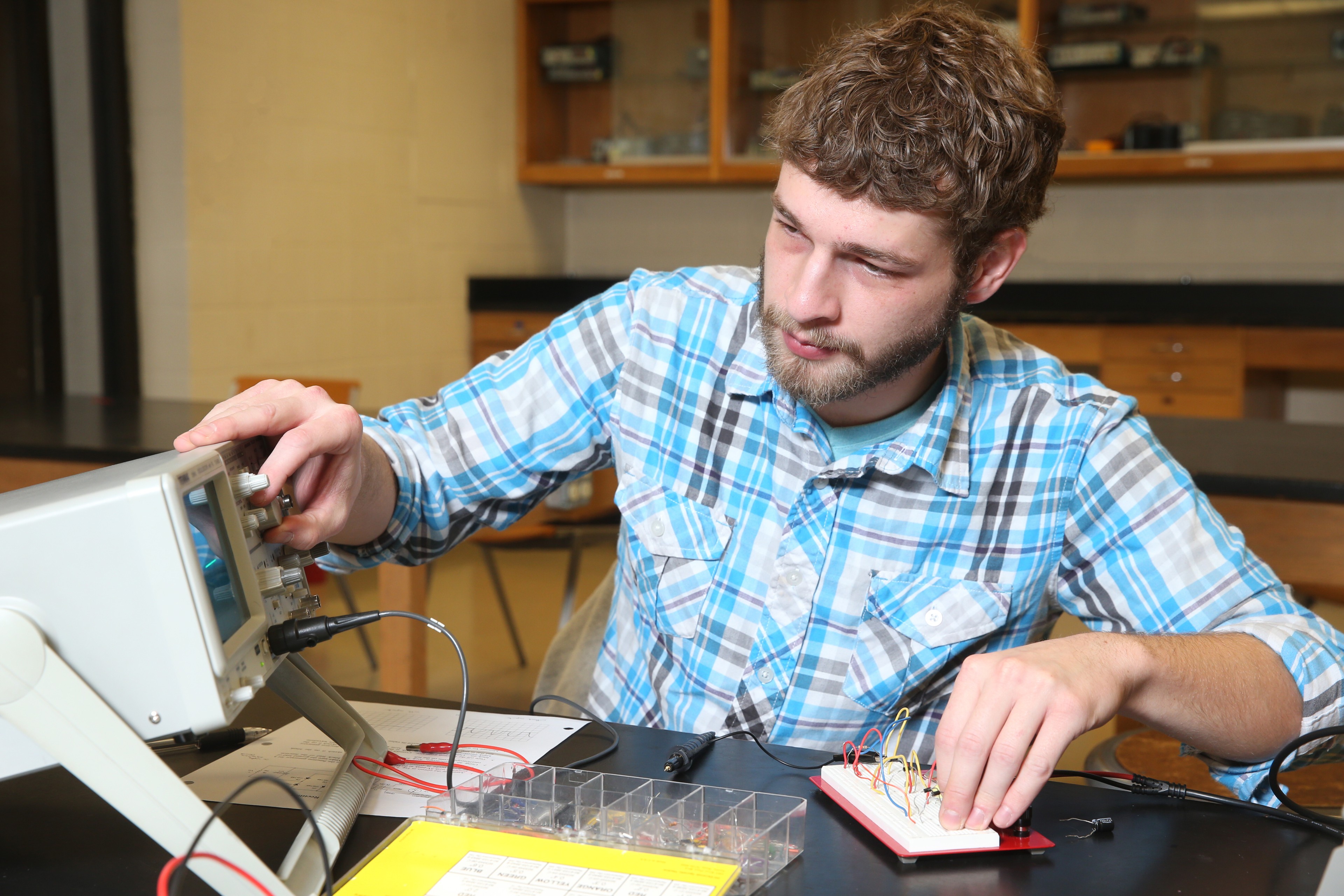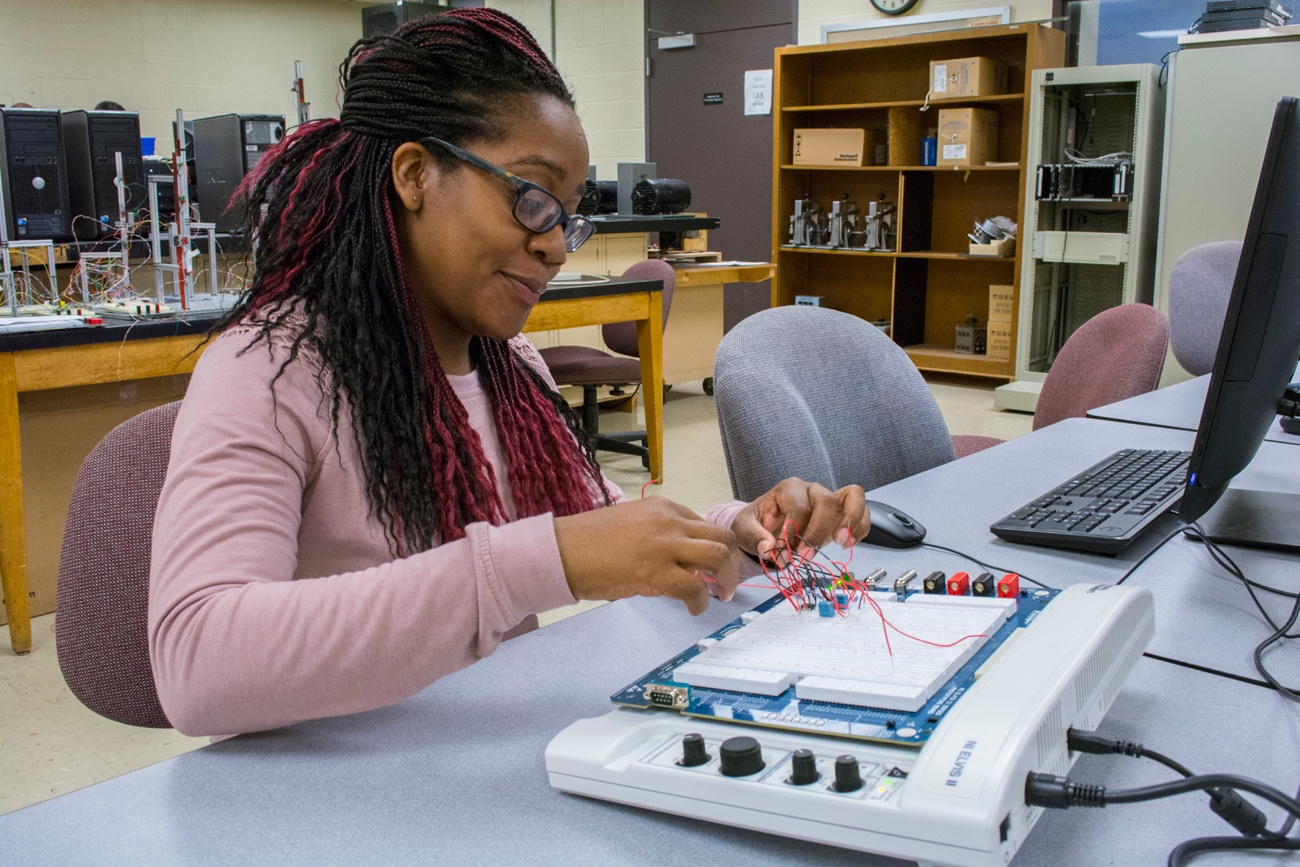
Bachelor of Science (B.S.)
Electronics and Computer Engineering
Demand for expertise in electronics and computer engineering technology is surging in a world of increasingly automated systems and tech-dependent societies. BGSU is at the forefront of it all right here in northwest Ohio with our specialized new program that provides a wealth of enriching career opportunities across diverse sectors.
Innovation in electronics and computer engineering (ECE) is revolutionizing modern life. Think surgical robots, cybersecurity systems, smart energy grids and wireless networks. More than mere machines, these are the means by which we save lives, protect the environment, work smarter and stay connected.
ECE majors are the dreamers and the doers. They possess both the creativity to think big and the technical skill to bring brilliant ideas to life.
Why study electronics and computer engineering at BGSU in Ohio?
- Leadership development. The ECE curriculum incorporates insights from other fields like business and communications unlike most traditional engineering programs. This ensures you can step directly into leadership roles upon graduation.
- Real-world experiences. BGSU pairs classroom instruction with hands-on work. The School of Engineering has 13 dedicated engineering laboratories. 80% percent of core engineering courses have a lab component. The ECE program also requires two paid cooperative education learning experiences from our accredited co-op program.
- Career coaches. You get 1:1 guidance in mapping your professional plans at the Michael and Sara Kuhlin Hub for Career Design and Connections.
- Professional Networks BGSU connects engineering students to career contacts and organizations through co-ops, competitions, research projects and lecture series. You can join groups like the International Society of Automation (ISA) and Institute of Electrical and Electronics Engineers (IEEE).
U.S. Department of Education data shows 100% of engineering degree graduates recoup their education costs within 5 years.
Electronics and computer engineering labs for next-level learning
Technology is a tactile field. The best way to learn is with hands-on training. BGSU has 13 state-of-the-art laboratories dedicated to engineering studies. Roughly 80% of core engineering courses include lab learning and projects.
BGSU continuously invests in the latest technological tools and resources to ensure you are set up for success as soon as you graduate.
Labs and spaces specifically for use by electronics and computer engineering majors include:
- Electronics and Computer Lab – 6,400 square feet of space equipped with DC power supplies, function generators, oscilloscopes, multimeters, PLC stations and more.
- Networking and Communications Lab – 1,500 square feet of space with CISCO networking equipment, server rack cabinets for CISCO, wireless equipment, a communications board and more.
- Controls and Instrumentation Lab – 3,000 square feet of space set up with 15 work stations, Q-robot arms, active suspension, Quasar Linear Servo Base and more.
- Support spaces – 22,000+ square feet of additional space, including project rooms, maker space, conference rooms, an innovation center, tech store and more.
Career - what can you do with a electronics and computer engineering degree?
Many BGSU students land their first job offers through co-op connections. Our roster of 3,000+ co-op partners includes big names like Marathon Petroleum, Owens Corning, NASA, Matrix Technologies, First Solar and more.
Career paths include computer engineering, process control systems, network administration, product development, sales and service.
Career paths
- Network engineers
- Electronic design engineer
- Hardware design engineer
- Cybersecurity analyst
- Manufacturing superintendent
- System designer
- Automation analyst
- Electronics design specialist
- Instrumentation and control engineer
Quick Facts from the Bureau of Labor Statistics
Curriculum
The ECE curriculum at BGSU is uniquely crafted to include a combination of theory and practice. We prioritize critical thinking, teamwork and big-picture perspectives to ensure engineering graduates are “real world ready.”
Become an expert in designing and developing electronic and computer systems:
- Computer hardware
- Semiconductor electronics
- Microcontrollers and embedded systems
- Communication systems
- Control and automation systems
- Energy systems
- And more
A total of 122 program hours is required to graduate. Coursework leans heavily on hands-on experience with lab learning, research projects and two semester-long co-ops. A bonus: the senior design project is industry-sponsored. Engineering students actively tackle real challenges in a collaborative, academic setting.

Sample courses
- Electric Machines and Drives
- Programmable Logic Controllers
- Electronic Devices and Integrated Circuits
- Microprocessors and Embedded Systems
- Electric Power Systems and Smart Grid
- Computer Communication Networks
- Instrumental and Signal Processing
- Wireless and Mobile Systems
- Computer and Wireless Security
The electronics and computer engineering program is part of the School of Engineering in the BGSU College of Technology, Architecture and Applied Engineering.
Accreditation
Bowling Green State University [BGSU] is accredited by the Higher Learning Commission. BGSU has been accredited by the Higher Learning Commission since 01/01/1916. The most recent reaffirmation of accreditation was received in 2022-2023, with our next reaffirmation of accreditation scheduled for 2032-2033. Questions should be directed to the Office of Institutional Effectiveness.
Request Information
Updated: 09/12/2024 02:59PM

